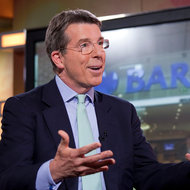 Jerome Favre/Bloomberg NewsRobert E. Diamond Jr., chief of Barclays.
Jerome Favre/Bloomberg NewsRobert E. Diamond Jr., chief of Barclays.
3:37 a.m. | Updated
LONDON – Robert E. Diamond Jr., the chief executive of Barclays, resigned on Tuesday less than a week after the big British bank agreed to pay $450 million to settle accusations that it had tried to manipulate key interest rates to benefit its own bottom line.
Mr. Diamond’s resignation, which was effective immediately, follows mounting criticism targeted at Barclays’ actions from politicians and shareholders.
The British prime minister, David Cameron, had called on individuals to take responsibility, while other local politicians had said Mr. Diamond should resign.
“My motivation has always been to do what I believed to be in the best interests of Barclays,” Mr. Diamond said in a statement. “No decision over that period was as hard as the one that I make now to stand down as chief executive. The external pressure placed on Barclays has reached a level that risks damaging the franchise. I cannot let that happen.”
Marcus Agius, the bank’s chairman, who resigned on Monday, will now stay at the bank and lead the search for a new chief executive, according to a statement from Barclays.
Mr. Agius will head the executive committee at Barclays until a new chief executive is appointed, and will be supported by Michael Rake, the firm’s deputy chairman.
While Mr. Diamond is stepping down at Barclays, he will face continued scrutiny on Wednesday when he testifies before a British parliamentary committee.
Local politicians are expected to question him about the actions within the bank that led to the multimillion-dollar fines from the Justice Department and the Commodity Futures Trading Commission in the United States and the Financial Services Authority in Britain.
Fresh details about the case show how Mr. Diamond and other senior executives played a role in the questionable actions and failed to prevent them.
In 2007 and 2008, Mr. Diamond’s top deputies told employees to report artificially low rates in line with its rivals, deflecting scrutiny about the health of Barclays at the height of the financial crisis, according to several people close to the case.
Barclays declined to comment.
Mr. Diamond’s resignation follows a settlement that Barclays struck last week with the American and British authorities, part of wide-ranging inquiry into how big banks set certain benchmarks, including the London interbank offered rate, or Libor.
Those rates are used to determine the costs of $350 trillion in financial products, including credit cards, mortgages and home loans. American and international regulators are investigating several other banks, including HSBC, JPMorgan Chase and Citigroup.
In a letter to Barclays employees on Monday, Mr. Diamond said he was “disappointed and angry” about the bank’s past attempts to manipulate key interest rates.
“I am disappointed because many of these behaviors happened on my watch,” he wrote.
The changes in Barclays’ leadership come after Mr. Diamond helped transform Barclays’ investment bank into a major player on Wall Street.
The American-born Mr. Diamond joined the British bank in the late 1990s, and quickly expanded the investment banking unit into new areas, such as commodities and derivatives trading.
At the height of the financial crisis, Mr. Diamond, then the head of the investment bank, Barclays Capital, beefed up the firm’s presence in the United States by acquiring the North American operations of Lehman Brothers in 2008.
“I am deeply disappointed that the impression created by the events announced last week about what Barclays and its people stand for could not be further from the truth,” Mr. Diamond said in a statement on Tuesday.
Article source: http://dealbook.nytimes.com/2012/07/03/chief-executive-of-barclays-resigns/?partner=rss&emc=rss
Speak Your Mind
You must be logged in to post a comment.